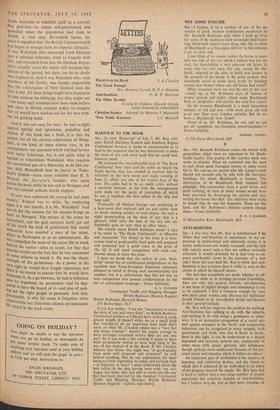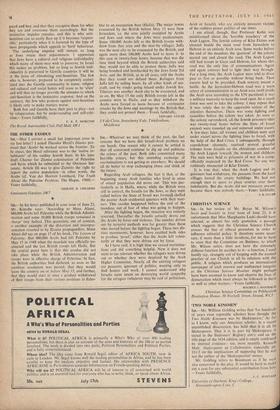ANTI-SEMITISM
SIR,-1 feel sure that Mr. Ray is misinformed if he thinks that anti-Semitism is uncommon. In my ex- perience in professional and university circles it is tacitly understood and widely accepted, and the few who openly assert such a bias are seldom seriously criticised. It would obviously be in bad taste to ex- press anti-Semitic views in the presence of a Jew and I think this may lead Mr. Ray to think that anti- Semitism is less common than it really is, even in the circles in which he himself moves.
The fact that exceptions are made, whether in ad- mission to clubs or in forming personal friendships, does not alter this general attitude; anti-Semitism is not born of logical thought and consistency is not to be expected. I find it common enough for men who have great respect and affection for individual Jewish friends to be nevertheless firmly anti-Semitic in their general attitude.
Mr. Ray will not improve the position by scolding. Anti-Semitism has nothing to do with the suburbs, and nothing to do with being a gentleman or other- wise. It is an instinctive antagonism of a social ani- mal against strangers in the 'herd,' and comparable behaviour can be recognised in many animals, both quadrupeds and birds, who live in herds or flocks. Seen in this light, it can be understood as a deeply ingrained and certainly natural vice, comparable in some ways with greed, gluttony and selfishness, though perhaps more unpleasant because of the per- sonal injury and injustice which it inflicts on others. An important part of civilisation is the mastery of impulses and instinctive desires, and the extent to which this is achieved by an individual is an index of his progress beyond the jungle. Mr. Ray may find it hard to believe that a very large number of people experience this primitive impulse of anti-Semitism, but I believe they do, just as they have impulses of
greed and lust, and that they recognise them for what they are and overcome them accordingly. But the instinctive impulse remains, and this is why anti- Semitism can so easily flare up if it becomes 'respect- able,' particularly when it is fostered by the type of mass propaganda which appeals to 'herd' behaviour.
The underlying impulse will remain so long as Jews retain their separateness. I appreciate that Jews have a cultural and religious individuality which many of them may wish to preserve. In Israel this makes no problem, but so long as Jewish indi- viduality is preserved in Gentile countries it will be at the price of stimulating anti-Semitism. The Jew who is, however, prepared to be completely assimi- lated into the Gentile community in name, religion Ind cultural and social habits will cease to be 'alien' and will thus no longer provide the stimulus to which anti-Semitism is the instinctive response. And on the contrary, the Jew who protests against anti-Semitism is likely only to make matters worse.
Both Jew and Gentile have their part to play—not by vituperation, but by understanding and self-criti- cism.—Yours faithfully,



































 Previous page
Previous page